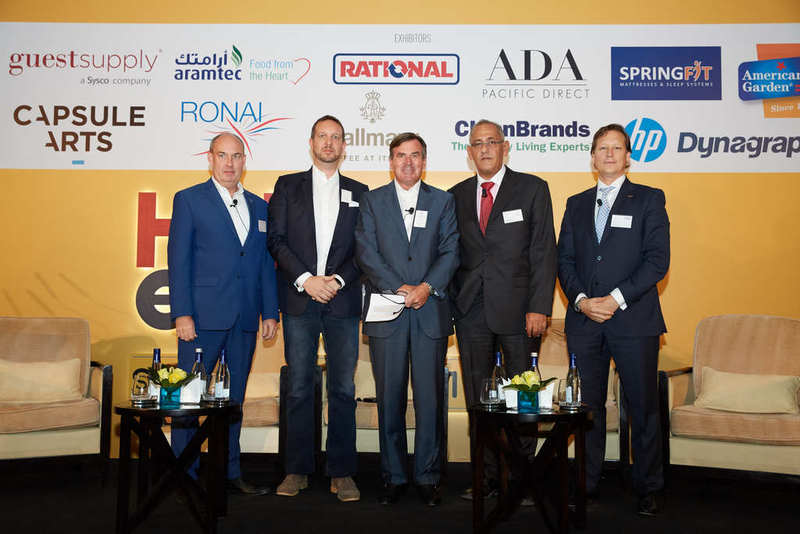 The members of the panel discussion entitled "Blurred Lines: Mid-scale Under Pressure" at the 2017 Hotelier Express Summit included (from left to right) Centro Sharjah general manager Michael Kasch; Aloft Al Ain general manager Andreas Plum; INHOCO CEO and panel moderator Rupprecht Queitsch; Al Khoory Hotels, hospitality division general manager Pierre Sokhon; and Time Oak Hotel & Suites Dubai general manager Guzman Muela.
The members of the panel discussion entitled "Blurred Lines: Mid-scale Under Pressure" at the 2017 Hotelier Express Summit included (from left to right) Centro Sharjah general manager Michael Kasch; Aloft Al Ain general manager Andreas Plum; INHOCO CEO and panel moderator Rupprecht Queitsch; Al Khoory Hotels, hospitality division general manager Pierre Sokhon; and Time Oak Hotel & Suites Dubai general manager Guzman Muela.
The blurring of segmentation lines between mid-scale hotels and upscale, even luxury, is here to stay for the next few years as Dubai and the UAE continue to mature as tourism destinations; with clear value propositions to customers, strong, confident products and service differentiation, mid-scale hotels are better positioned than other segments when it comes to profitability.
So concluded the panel members of a discussion entitled "Blurred Lines: Mid-scale Under Pressure" at the second Hotelier Express Summit which was held November 22 at Grosvenor House, Dubai. Moderated by International Hospitality Consulting (INHOCO) Group CEO and conference chairman Rupprecht Queitsch, the panel members included Centro Sharjah general manager Michael Kasch, Aloft Al Ain general manager Andreas Plum, Al Khoory Hotels hospitality division general manager Pierre Sokhon and Time Oak Hotel and Suites Dubai general manager Guzman Muela.
From the get go, the entire panel was unanimous in saying that the current situation of segmentation lines between mid-scale and upscale hotels occurring in Dubai and Abu Dhabi would continue, resulting in a scenario for the next few years, described by the panel as both "confusing" and "painful" with a "lot of uncertainty" for hoteliers all around.
However, while Al Khoory's Sokhon cautioned that the situation is "reality" and that both hoteliers and hotel owner must be convinced that lower occupancies and rates are only to be expected as "normal" in 2018, everyone agreed that the future does not necessarily have to present a complete 'doom and gloom' scenario.
Aloft's Plum said: "The benefits of being in mid-scale can be seen in a few years. We have lower operating costs and from a profitability perspective, we are still better positioned than upscale and luxury hotels".
Centro's Kasch seconded the statement and added: "Within the Rotana group, Centro is the fastest growing brand. We are cheaper to build and to operate and the owners can see faster returns compared to their upscale assets. We remain popular with customers and this is seen in our high occupancies."
All the hoteliers in the group subsequently chimed in with various recommendations as to how mid-scale operators should not only cope but actually thrive in such a challenging environment.
Kasch said that for branded operators, adherence to brand and operational standards is key.
"We have very strict guidelines at Centro as our owners and customers have high expectations so we stick to these guidelines, which are simple, straightforward, no fuss, and don't try to do anything fancy," he said.
Plum, for his part, also advocated for a strong brand identity, saying that this is what will initially attract customers to book and stay but added that attention to service and guest experience would is where mid-scale hotels can differentiate.
Referring to Aloft Hotels, Plum said: "Select service does not necessarily mean limited service because you have to do select services very well."
"The differentiation in future lies in service," he added.
It's not about the size of the room, it's about the customer and how you deliver service. This is where mid-market hotels have an advantage, says @aloftalain's Andreas Plum. #HotelierExpress2017
— Hotelier Middle East (@HotelierME) November 22, 2017
Time's Guzman stressed the value of knowing one's customer base to the point of knowing their behavior and preferences and how these would then align to an operator's mid-scale hotel product.
"The key to success is knowing where you are standing, knowing your customer base completely and have a basis for understanding your customer's behavior," he said.
Guzman added: "Make your identity clear and the product that you are selling and understand what is is that your customers want from you."
Guzman Muela @TIMEOAKHOTEL says the key to success is to know very well where we're standing and what the customer base, and what they expect from the product. #HotelierExpress2017
— Hotelier Middle East (@HotelierME) November 22, 2017

| Advertisement |










 Search our database of more than 2,700 industry companies
Search our database of more than 2,700 industry companies









